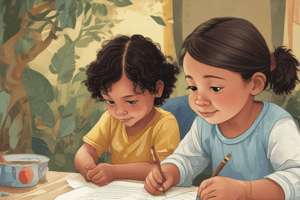Podcast
Questions and Answers
Match the developmental areas with their corresponding skills for children ages 3 to 5:
Match the developmental areas with their corresponding skills for children ages 3 to 5:
Fine Motor Skills = Cutting with scissors Language Development = Using simple sentences Social Skills = Sharing toys Cognitive Development = Counting objects
Match the learning activities with their benefits for children ages 3 to 5:
Match the learning activities with their benefits for children ages 3 to 5:
Playdough activities = Enhances fine motor skills Storytime = Boosts language comprehension Group games = Develops cooperation Puzzle solving = Improves problem-solving skills
Match the assessment methods with their purposes for young children:
Match the assessment methods with their purposes for young children:
Observational assessments = Evaluate behaviors in natural settings Standardized testing = Compare against developmental milestones Parent questionnaires = Gather insights on home experiences Art projects = Assess creativity and expression
Match the developmental milestones with the appropriate age range:
Match the developmental milestones with the appropriate age range:
Match the types of play with their developmental benefits:
Match the types of play with their developmental benefits:
Flashcards
Assessment Form
Assessment Form
A tool used to evaluate children's development and learning.
Development Milestones
Development Milestones
Key skills children should achieve by certain ages.
Learning Areas
Learning Areas
Different subjects or skills to be evaluated, such as motor skills and language.
Age Range
Age Range
Signup and view all the flashcards
Observation Techniques
Observation Techniques
Signup and view all the flashcards
Study Notes
Assessment Form for Children Ages 3-5
-
Purpose: To assess developmental milestones and learning progress in children aged 3-5.
-
Target Audience: Educators, parents, and healthcare professionals working with children in this age range.
-
Key Areas of Assessment: The form should cover key developmental domains. These include:
-
Gross Motor Skills: Physical abilities like running, jumping, climbing, and balance.
-
Fine Motor Skills: Dexterity skills such as drawing, manipulating small objects, and using utensils.
-
Language Development: Communication skills, including vocabulary, sentence structure, and comprehension.
-
Social-Emotional Development: Emotional regulation, social interactions, and self-awareness.
-
Cognitive Development: Thinking skills, problem-solving abilities, and learning processes.
-
Assessment Tools: The form should utilize a variety of assessment methods. These should include:
-
Observation: Direct observation of the child's behavior in various situations. The observer should note specific examples of skills demonstrated and any struggles.
-
Parent/Teacher Input: Questions to solicit information from parents or caregivers about the child's routines and behaviors at home or in daycare/preschool.
-
Standardized Tasks: Simple activities or tasks that allow the assessor to gauge the child's competence in a specific skill. Tasks should be age-appropriate and engaging.
-
Questions for each area: The form should include specific questions for each area of development.
-
Gross Motor Skills: "Can the child run, jump, and climb stairs independently? Does the child show balance issues?"
-
Fine Motor Skills: "Can the child hold a crayon or pencil and draw simple shapes? Can the child use utensils to eat independently?"
-
Language Development: "What is the child's vocabulary size? Does the child use simple sentences to communicate their needs and wants? Does the child follow simple instructions?"
-
Social-Emotional Development: "Does the child display appropriate emotional responses to various situations? How does the child interact with peers? Does the child show empathy or concern for others?"
-
Cognitive Development: "Can the child solve simple puzzles or problems? Does the child show curiosity and ask questions? Does the child participate in imaginative play?"
-
Rating System: A scoring system should be included for each skill. This should focus on the child demonstrating the skill and not solely on the level of proficiency. Examples include:
-
Demonstrates skill reliably (3 points): The child consistently displays the skill.
-
Demonstrates skill with support (2 points): The child displays the skill with help from the assessor.
-
Demonstrates skill inconsistently (1 point): The child can demonstrate the skill sometimes under specific conditions.
-
Does not demonstrate skill (0 points): The child does not display the skill at all.
-
Example Activities to Assess Skills:
-
Gross Motor Skills: Walking, jumping rope, climbing stairs, hopping.
-
Fine Motor Skills: Stacking blocks, drawing shapes, using scissors, cutting with scissors.
-
Language Development: Following simple instructions, describing objects, answering simple questions.
-
Social-Emotional Development: Taking turns, sharing, expressing emotions, following rules.
-
Cognitive Development: Sorting objects by color or shape, completing puzzles, asking questions, engaging in pretend play.
Additional Considerations
- Cultural Considerations: The assessment should be adapted to consider diverse cultural backgrounds and learning styles, avoiding biases in assessment.
- Individual Variation: Recognize individual developmental trajectories. Some children will progress faster than others. The emphasis should be placed on if the child is reaching the stage they should be during their specific age group.
- Flexibility: The assessment should be flexible and adapted to each child's needs. The form should be appropriately adjusted in case of medical conditions that might hinder a child's development to ensure accurate results.
Importance of Regular Assessments
- Early Identification of Needs: Early assessment allows for early intervention and support for children who may be experiencing developmental delays.
- Monitoring Progress: Regular assessments help monitor the child's progress and track their development through time.
- Individualized Support: Assessments provide valuable insight into a child's needs and strengths, allowing educators and parents to create individualized support plans.
- Parent/Teacher Collaboration: Assessments facilitate communication and collaboration between parents and educators to ensure consistent support for the child's growth.
Studying That Suits You
Use AI to generate personalized quizzes and flashcards to suit your learning preferences.




